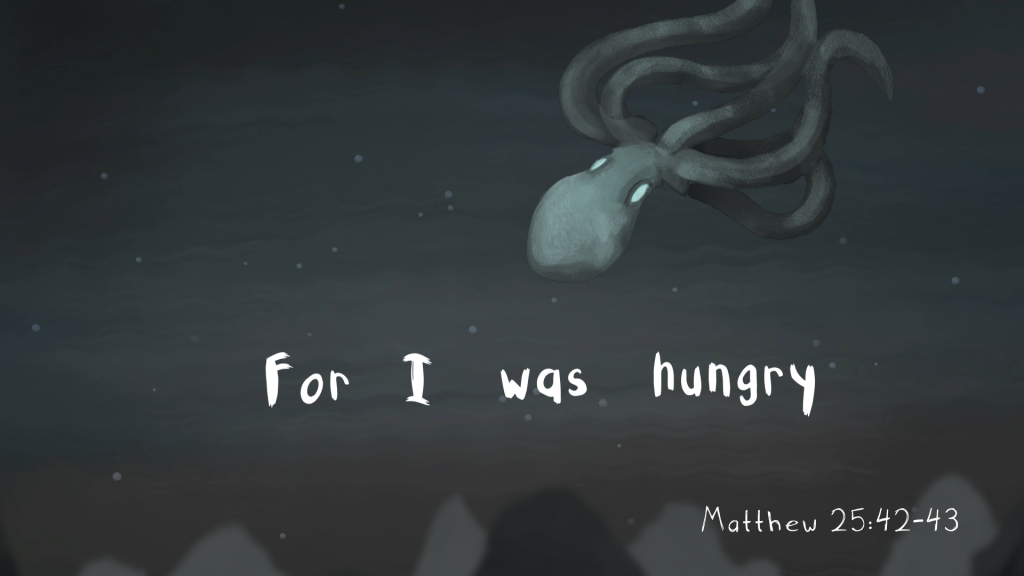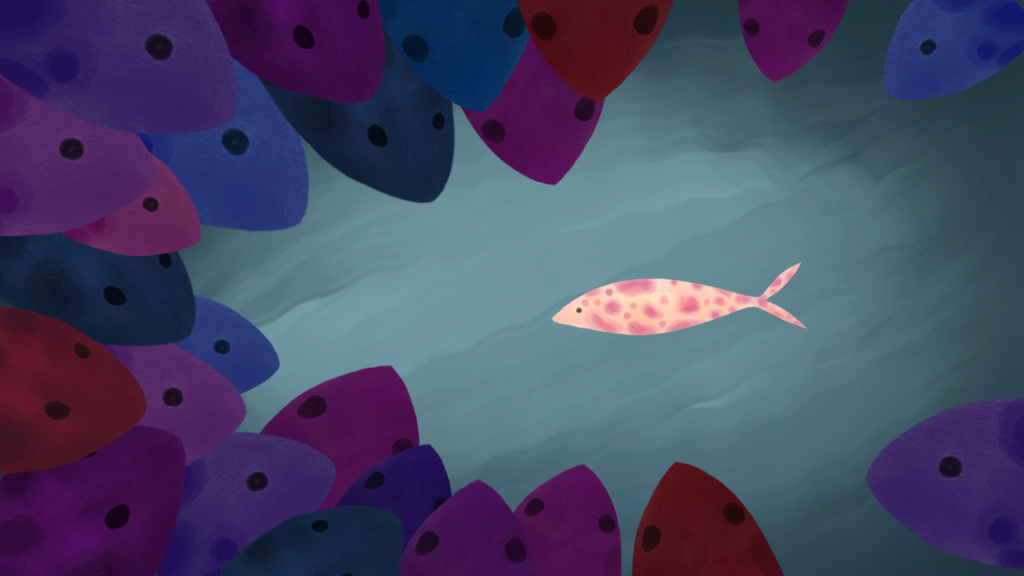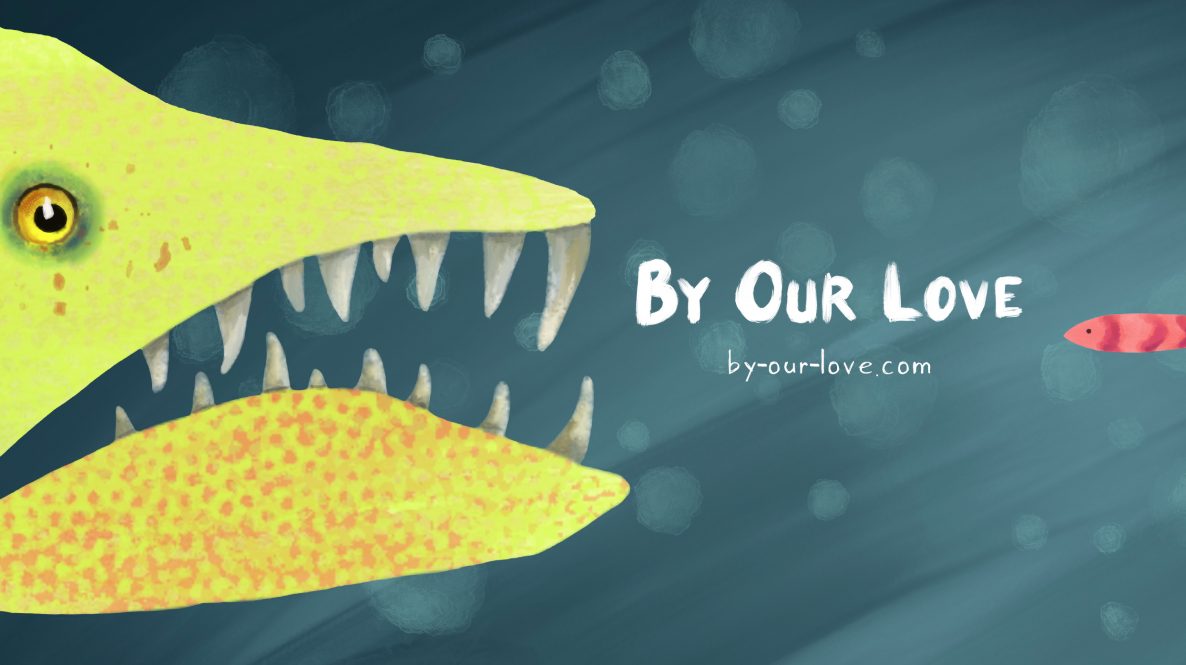“By Our Love,” an animated short video produced by UConn’s Greenhouse Studios, will facilitate the Encounters Series program titled “Paradox in Political Tribalism,” to be held via Zoom on Thursday, Feb. 4 at 7:30 p.m.
The video was initially conceived by two faculty members in the School of Fine Arts, Cora Lynn Deibler, professor of illustration and area coordinator for Illustration/Animation in the Department of Art & Art History, and jazz composer Earl MacDonald, professor of music and Director of Jazz Studies.
An advanced screening of “By Our Love” took place on Thursday, Jan. 21 for clergy and faith leaders within the UConn interfaith community, with plans for the video to be uploaded Jan. 22 on the project website. MacDonald’s musical arrangement is available on all major streaming services. The Encounters series conversation on Feb. 4 is open to the public.
The animation, just over nine minutes in length, uses images of multicolored schools of fish swimming in groups to illustrate several Biblical quotations representing a mix of commonly accepted Judeo-Christian virtues over a soundtrack of MacDonald’s brooding, jazz arrangement of the Christian hymn, “They’ll Know We Are Christians By Our Love.”
The Encounters Series is a program of the Democracy and Dialogues Initiative dedicated to fostering unexpected conversations around divisive issues through Dodd Human Rights Impact. There are readings provided in advance, and small-group dialogues followed by a question-and-answer conversation with UConn faculty and community partners. Topics in the series, which began in 2017, have included the Voting Rights Act, Intrafaith Conflict, Alchemy & Science, and Togetherness: Confronting Racism.
“It’s not entirely new that we’re using a video as a spur for conversation, but it is quite interesting that we have a text that undergirds the entire conversation,” says Brendan Kane, associate professor of history, who helped launch Encounters. “We’re going to do a slightly different last round. It’s going to be a bit less engagement with the experts and much more sharing of what came out of the individual breakouts. It’s more of a creative tweak. We’re excited about it.”

MacDonald says the idea for the animation began after he heard “They’ll Know We Are Christians By Our Love” during a church service following the 2016 Presidential election. He wanted to respond to rhetoric from the campaign that, although in conflict with teachings in the Bible, did not deter white, evangelical support for Donald Trump. He composed and performed an original work, but the audience response was not what he expected.
“I wasn’t aiming for polite applause. I realized for them to understand what statement I was making, I needed it to be a little bit more obvious,” says MacDonald.
He began imagining a visual component to help audiences better understand his theme, and he reached out to his colleagues Deibler and Kane, both members of the Greenhouse Studios steering committee.
As part of their conversations about the possibility of a panel discussion, they met with others on the Greenhouse team, who suggested the Encounters format.
“It just became more and more interesting the way we talked about a more inclusive dialogue, rather than the common panel discussion with a standard audience question-and-answer period, and that seemed to fit the content as well,” says Deibler. “Once we had the opportunity to talk with him about how that all works it kind of quickly became our focus.”
MacDonald says he initially was thinking of using presentation graphics with statistics, pie charts, and quotes to guide the listener’s thoughts.
“Admittedly, I had a functional rather than artistic vision for the visual aspect,” he says. “Cora Lynn started to think metaphorically. She used the image of fish. I thought this was pure genius. As you know, the Ichthys fish symbol is used by Christians on bumper stickers, to identify themselves.”
Deibler says she wanted to avoid featuring specific images of people, and began to think about types of animals that exhibit large group behavior, primarily birds and fish. This was a strategy to insure there would be an open pathway for everyone in the audience to consider the aspects of group behaviors or tribalism represented by the images.
“As I thought more about this, it kind of suggested to me that using fish would also have that symbolic tie-in with Biblical things,” she says. “It would really be, from an artistic aspect, a way to visually create what would look like different groups through size and color. I’m used to working with text as a partner with the images. That’s when I started to think: Let’s pick out some Scripture that really helps to support what’s being said with the music. At first, it looks like an innocent film about fish with this brooding music underneath. Then we intersperse some scriptural references and you start to say think: okay, so what are they saying here?”

Deibler spoke with her brother and sister-in-law, who are Lutheran ministers, about Scripture that would reflect the idea referenced in “They’ll Know We Are Christians By Our Love,” the hymn composed by Peter R. Scholtes, a Catholic priest and choir leader who later became a business management consultant and author. The texts contained in the animation include:
• Leviticus 19:33-34: “When a foreigner resides among you in your land, do not mistreat them.”
• Matthew 25: 42-43: “I was hungry and you gave me nothing to eat, I was thirsty and you gave me nothing to drink, I was a stranger and you did not invite me in, I needed clothes and you did not clothe me, I was sick and in prison and you did not look after me.”
• Leviticus 19:16-18: “You shall not profit by the blood of your neighbor… but you shall love your neighbor as yourself.”
As the work progressed on developing the animation, the project became increasingly collaborative. Three highly-skilled Fine Arts undergraduates, illustrator Hal Tedeschi and digital animators Carly Wanner-Hyde and Miles Waterbury, were recruited to collaborate on bringing the vision of the images to life. Greenhouse Studios design technologists Tom Lee and Brooke Foti Gemmell served as producers, and an ensemble of 11 professional musicians were recorded at PBS Studios in Westwood, Massachusetts. Sources of funding included the Andrew W. Mellon Foundation, School of Fine Arts Research Fund, a SHARE award, the Research Excellence Program, and an Artistic Excellence Grant from the Department of Economic and Community Development.
MacDonald and Deibler say their goal is not to present an opinion, but to ask questions and have people respond.
“What I would love to happen with the audience would be to cause people who encounter this piece to really engage in some self-reflection and maybe think differently about how they’re going about things, just become a little more conscious of what they’re doing and how they’re incorporating the positive aspects of their faith in the day to day,” Deibler says. “The idea is to raise these questions, not really to provide any answers.”
For more information go to the By Our Love webpage.



